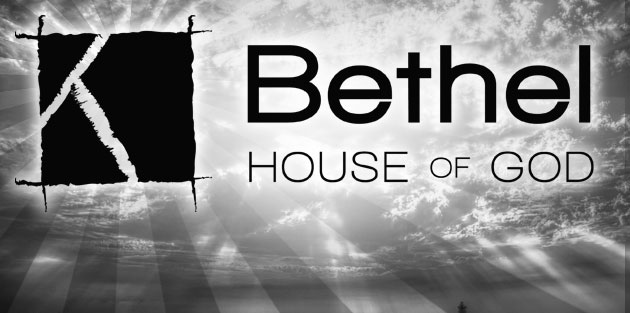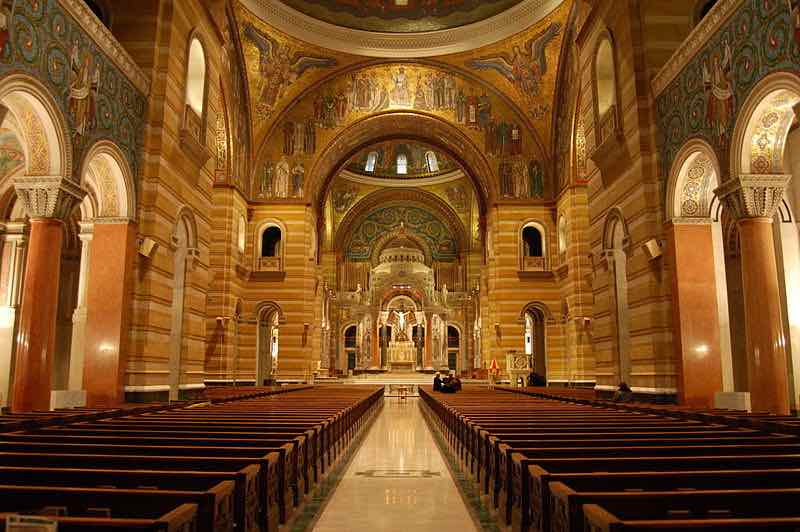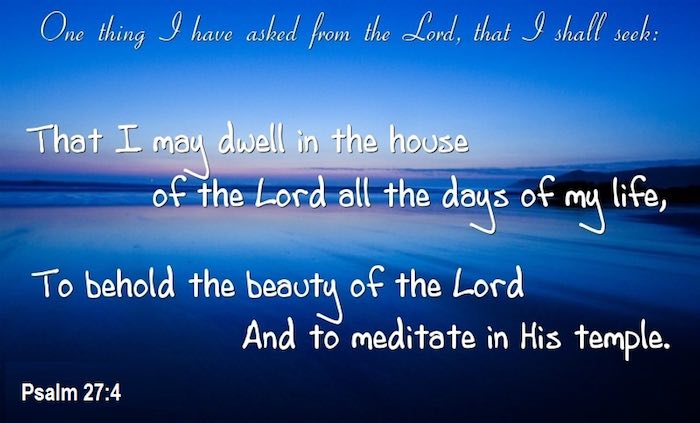It is common to hear a place of worship referred to as a “house of God.” We don’t generally believe that God actually lives in a certain structure, however, we do set apart earthly structures for corporate prayer, worship, and instruction in God’s Word. As a result of the dedication of certain locations to the worship and glory of God, it is natural to refer to these places as houses of God.
The initial reference to the phrase “house of God” in the Bible appears in Genesis 28 when Jacob had a dream and saw angels ascending and descending on a ladder stretched from earth to heaven. The LORD spoke to Jacob in this dream and promised to watch over him while confirming the promises which He had previously given to his fathers, Isaac and Abraham. Jacob responded to this supernatural dream in the following manner:
Then Jacob awoke from his sleep and said, “Surely the LORD is in this place, and I did not know it.” He was afraid and said, “How awesome is this place! This is none other than the house of God, and this is the gate of heaven.” – Gen. 28:16-17
Jacob experienced an encounter with God that would be the cornerstone of his faith over the next twenty years of his life as he dwelt in a foreign land.
Beit Elohim – House of God
Jacob declared that the LORD was in the place where he had had the dream and concluded that it was “בית אלוהים” – “beit Elohim” – literally, “house of God.” There was no building or physical structure in that place but God’s presence was there in such a real way that Jacob named that place “בית אל” – “Beit El” – “House of God” (Gen. 28:19).
The phrases “House of God” and “House of the LORD” are used hundreds of time throughout the Bible in both a literal and figurative sense. In this week’s reading from the prophets, we read about the desire of King David to literally build the house of God in order to provide a permanent and lasting structure for the ark of the covenant.

The Ark of the Covenant
The reading from the prophets is found in 2 Samuel chapters six and seven. We are all familiar with the story that is found in these chapters, the story of King David’s desire to bring up the ark of the covenant from the house of Abinadab, which was located outside of Jerusalem, to the City of David:
And David arose and went with all the people who were with him to Baale-Judah, to bring up from there the ark of God which is called by the Name, the very name of the LORD of hosts who is enthroned above the cherubim. – 2 Samuel 6:2
The ark represented the very presence of God. The place where the cherubim covered the ark was called the place of atonement and it was in this place that God’s presence would reside in the camp of Israel (Ex. 25:20-22).
In the verse quoted above, the ark is not called “The Ark of the Covenant” but rather “ארון האלוהים” – “Aron HaElohim” – “The Ark of God.” Throughout this section of 2 Samuel chapters six and seven the ark is never called the ark of the covenant, but rather, it is continually called “the ark of God” or “the ark of the LORD.” There is no reason given for this, however, I wonder if God is reminding us that He is to be the center of our worship and not the covenant or the piece of furniture itself.
The Ark of God
David and the men of Israel brought up the ark of God from the house of Abinadab, however, they failed during this first attempt. They did not follow God’s prescribed instructions regarding the ark and Uzzah was struck down by the LORD when he tried to steady the ark by reaching out and touching it (2 Samuel 6:1-11). The death of Uzzah caused David and the people to lose heart and they left the ark at a nearby place, the home of Obed-Edom.
After a period of three months, David gathered together the Levites and the sons of Aaron to bring the ark up from the home of Obed-Edom to the city of David in Jerusalem (1 Chronicles 15:1-2). This time David and his men followed the instructions of the LORD regarding the ark of God and they succeeded without any incident:
So they brought in the ark of the LORD and set it in its place inside the tent which David had pitched for it; and David offered burnt offerings and peace offerings before the LORD.” – 2 Samuel 6:17
The ark of the LORD was brought into the city of David and they placed it inside a tent.
Building The House of God
Although King David rejoiced when he brought up the ark of God into the city where he dwelt, David felt guilty for living in a spacious palace while the ark of God dwelt in a lowly tent:
Now it came about when the king lived in his house, and the LORD had given him rest on every side from all his enemies, that the king said to Nathan the prophet, “See now, I dwell in a house of cedar, but the ark of God dwells within tent curtains.” Nathan said to the king, “Go, do all that is in your mind, for the LORD is with you.” – 2 Samuel 7:1-3
There was peace in the kingdom and King David was released from going out to fight battles. During his days of leisure, David felt like he should do more for the vessel that carried the presence of the LORD. David desired to build a house for God!
David was called a man after God’s own heart and David truly loved the LORD. I believe we see an expression of David’s love for God in his desire to build a more permanent residence for the ark of God, however, the LORD made it clear to David that this was not His number one priority:
But in the same night the word of the LORD came to Nathan, saying, “Go and say to My servant David, ‘Thus says the LORD, “Are you the one who should build Me a house to dwell in? For I have not dwelt in a house since the day I brought up the sons of Israel from Egypt, even to this day; but I have been moving about in a tent, even in a tabernacle. Wherever I have gone with all the sons of Israel, did I speak a word with one of the tribes of Israel, which I commanded to shepherd My people Israel, saying, ‘Why have you not built Me a house of cedar?’”’ – 2 Samuel 7:4-7
The LORD answered David’s request through the prophet Nathan and the LORD told David that he was not the one to build a house for Him.
Although this word of the LORD to David may sound harsh, I don’t believe that God was angry or scolding David, but rather, it seems that God was making it clear to David that He does not need a permanent house to dwell in on earth. The LORD reminded David that He moved about in a tent and Tabernacle all throughout the journeys of the Israelites. The focus of the LORD has always been to dwell with His people and not to simply have a monument built to His Name. Men love buildings, God loves people!

Building the House of David
After declaring to David that he would not be the one to build a house for God, the prophet Natan informed David that God Himself would build David’s house:
The LORD also declares to you that the LORD will make a house for you. When your days are complete and you lie down with your fathers, I will raise up your descendant after you, who will come forth from you, and I will establish his kingdom. He shall build a house for My name, and I will establish the throne of his kingdom forever. – 2 Samuel 7:11-13
God declared to David that the kingdom that had begun with him would continue forever through his seed and lineage.
The LORD spoke of the son that would come forth from David and literally sit on the throne after him. The LORD declared that it would be this son of David who would build a physical house for the Name of the LORD. This prophecy to King David was fulfilled through his son Solomon who was born to him and built the Temple of God in Jerusalem.
An Eternal House
Although there was an immediate fulfillment of this prophecy to David through his son Solomon, there was also an ultimate fulfillment of this prophecy through Yeshua the Messiah who would sit on the seat of the throne of David and reign forever as the King of Israel. The LORD had promised to build David’s house and to establish his kingdom forever. This was a spiritual promise of an eternal kingdom that could only be fulfilled through the Messiah.
David would never see the physical house of God that was to be built. God had promised David that his son would build a house to bear the Name of God. Solomon built the Temple of the LORD and it was the glory of the kingdom until it was destroyed approximately 400 years later.
The Spiritual House of God
The LORD taught David a great lesson on the day that He spoke to him through the prophet Nathan regarding the house of God. There would be a physical house that would be built in His Name, the Temple that Solomon built, but that house would come and go. More important than a house of God on earth was the eternal dwelling of God with His people. David surely understood what God was teaching him and realigned his thinking to God’s priorities.
In reading the Psalms, I have often wondered why King David talks about going to or spending time in the house of God when he never saw the physical house of God built in his days. In Psalm 22 we read the following words, which are attributed to King David, about going up to the house of the LORD: “I was glad when they said to me, ‘Let us go to the house of the LORD.’” (Psalm 122:1) This psalm is one of the song of ascents, which is one of the psalms which is sung in procession to the house of God. How could King David rejoice about going to the house of the LORD if the Temple was not built in his days? Which house did David ascend to?
David was a worshipper of God and David had learned through his life of seeking God and hearing from Him that God was not bound to a certain location. Yes, God could and would choose a location in Jerusalem to place His Name and have a Temple built for continual worship of Him, however, David understood that there is a house of God that is beyond the scope of human hands. The spiritual house of God is manifested on earth by beholding God in worship and enjoying His presence.

One Thing
The house of God represents the dwelling of God. In all that David had suffered throughout his life, he continually sought the presence of God and longed to fill his days with sitting before the LORD:
One thing I have asked from the LORD, that I shall seek:
That I may dwell in the house of the LORD all the days of my life,
To behold the beauty of the LORD and to meditate in His temple. – Psalm 27:4
Without ever seeing the physical house of the LORD, David had been in the house of the LORD numerous times through his intimate encounters with the God of heaven and earth.
David knew the pain and joy of waiting on the LORD and having Him answer him in his times of trouble. David knew the pleasure in taking time out to worship the LORD in song and sitting silent in His presence. David knew the thrill of going with others to worship the LORD in Jerusalem through the various feasts and rejoicing together with the people of God in thanksgiving for all that the LORD had done for them. David loved being in the presence of God and he knew that God’s presence was found in that intimate place of worshiping Him. It is the worship of God that makes the true House of God and not the building materials.

A House of Prayer
The Temple that King Solomon built on Mt. Moriah nearly 3000 years ago was destroyed by the Babylonians in the sixth century BC and then rebuilt about seventy years later. The Second Temple would stand for over five hundred years with some modifications under King Herod at the end of the first century BC.
Yeshua was born under the reign of the roman ruler, King Herod, and often taught in the courtyard of the Temple that stood in His days. At one point during Yeshua’s ministry years, Yeshua cleansed the Temple area and quoted these famous words from the prophets:
Yeshua entered the temple and began to drive out those who were selling, saying to them, “It is written, ‘And My house shall be a house of prayer,’ but you have made it a robbers’ den.” – Luke 19:45-46
Yeshua was incensed by the manner in which many in His day were profiting from the ceremonial system handed down to them from the Law of Moses. Yeshua’s actions were followed by two quotes, one from the prophet Isaiah and the other from the prophet Jeremiah, respectively.
When Yeshua quoted from the prophet Isaiah, He was reminding all of those who were at the Temple of the intent of God’s heart regarding the House that bore His Name. The purpose of God’s House was to have a place of communion with Him. The quote from Isaiah reads in its full context: “For My house will be called a house of prayer for all the peoples.” (Isaiah 56:7) God’s House was to a place of prayer and communicating with the Creator God and this was not a limited benefit for the Israelites. God’s House was to be a place of prayer for all peoples and all nations.
God’s House Today
Through the life and death of Yeshua a new covenant has been instituted which provides a new and living way to access the Father in heaven. The Holy Spirit has been given to all who call on the name of Yeshua and the indwelling of the Holy Spirit literally makes each one of us a temple or house of the living God (1 Corinthians 6:19).
Those who believe in Yeshua as the Messiah have literally become the spiritual house of God and are called to operate as a spiritual entity much like the physical house which once stood in Jerusalem:
And coming to Him as to a living stone which has been rejected by men, but is choice and precious in the sight of God, you also, as living stones, are being built up as a spiritual house for a holy priesthood, to offer up spiritual sacrifices acceptable to God through Yeshua the Messiah. – 1 Peter 2:4-5
The imagery of being spiritual stones and a spiritual house reminds us that individually and collectively as believers in God through Yeshua the Messiah we are to operate as God’s priests and as His spiritual house of worship on this earth.

Many people in this world wander from place to place and from church to church looking for God but rarely find Him. Others limit God to a location and a religious system, rather than a Being who desires intimate relationship with His creation. We who believe in God and our filled with His Holy Spirit need to walk in the reality that we are the “House of God” on this earth and we are called to actively worship God with our lives, both individually and corporately, wherever we may find ourselves. We may be the only “House of God” that some people will ever see or meet.
Shabbat Shalom – We welcome your comments below!
If you enjoyed reading this article, share it today with friends! We also invite you to sign up for our weekly Torah Portion commentary on the sidebar to the right.
Help keep our weekly commentaries free and available to all. Click here to donate today:
Torah Portion: Lev. 9:1 – Lev. 11:47
Haftara: 2 Samuel 6:1 – 2 Samuel 7:17
Return to Torah Portion Homepage
Copyright Jewels of Judaism. All rights reserved 2017



Thank u brother Daniel. I received an insight through this reading.
Max from Kazakhstan
Praise God!
Blessings,
Daniel
This is a very good commentary. I am always impressed by the heart of David and his relationship with God. It is certainly worth imitating! I moved recently and am seeking a new church to worship with other believers. I enjoy corporate worship and over the years I have come to experience God’s presence in a more significant way in that setting. Hopefully, I will find a place soon. God bless you, Daniel. Shabbat Shalom.
Thanks Rosa. I appreciate the feedback. I hope you find a new community of believes to join soon.
God bless you!
Daniel
Thank you Daniel for yet another wonderful commentary. It really resonated with me as our home group had a discussion this past Wednesday evening about the difference between just attending church every week and “being” the church in the way we live our lives and in the way we connect with others, during the week. And yes, there is also a saying that we may be the only Bible that some people ever read.
We definitely saw you operating as a spiritual entity during the time you spent with us here in Toowoomba, Australia and we give thanks to God for your friendship and teaching.
Blessings,
Carolyn
Thank you for the feedback Carolyn. May your home group be a lighthouse in your neighborhood and may each individual be a beautiful stone in the house of God!
Shabbat Shalom,
Daniel